
Ground beetles are a large, cosmopolitan family of beetles, the Carabidae, with more than 40,000 species worldwide, around 2,000 of which are found in North America and 2,700 in Europe. As of 2015, it is one of the 10 most species-rich animal families. They belong to the Adephaga. Members of the family are primarily carnivorous, but some members are herbivorous or omnivorous.

Mecodema is a genus of large flightless ground beetle (Carabidae) endemic to New Zealand. The genus is very diverse in comparison to the other three New Zealand genera within the subtribe Nothobroscina. Mecodema is geographically widespread across both the North and South Islands, as well as numerous offshore islands, including the Three Kings Is., Poor Knights Is., Aotea and Hauturu, Kapiti Is., Stephens Is., Stewart Is., Chatham Is., Snares Is.

Mecodema oconnori is a large-bodied species of ground beetle that is found mainly on the western regions of the North Island, New Zealand. It is mainly found in native forest habitats, both intact and fragmented, and on the edges of pine plantations. Mecodema oconnori ranges from Otaki, Kapiti Coast to Raglan, but is also found in the Manawatu Gorge and some other eastern localities.
Axonya is a genus of ground beetle in the subfamily Broscinae. The genus was described by Herbert Edward Andrewes in 1923 with species being found across Southern Asia and containing the following species:

Mecodema antarcticum is a carnivorous carabid beetle that burrows in sand above the high tide mark on New Zealand sandy beaches. First described by Francis de Laporte de Castelnau in 1867 as Brullea antarctica, it has since been reassigned to Mecodema.
Eobroscus is a genus of beetles in the family Carabidae which was circumscribed by Oleg Leonidovich Kryzhanovsky in 1951. Its species are found in Russia, China, Korea, Japan, China, Taiwan, Bhutan, and Vietnam. As of 2017, it contains the following three species:
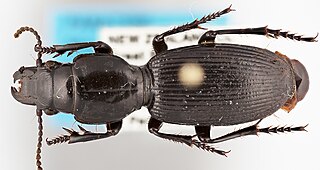
Mecodema aoteanoho is a medium-sized ground beetle, the only such beetle endemic to Great Barrier Island (Aotea), Hauraki Gulf, Auckland, New Zealand. Mecodema aoteanoho is a sister species to M. haunoho and is closely related to the Coromandel (mainland) species, M. atrox, all of which are species within the monophyletic curvidens group. There are a number of other characters that distinguish M. aoteanoho from all other North Island Mecodema, especially the pattern of the striations on the elytra.

The tribe Broscini is a worldwide group of beetles in the Broscinae subfamily of Carabidae.
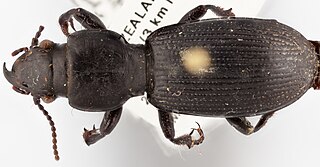
Mecodema atrox is a medium-sized ground beetle species that is closely related to Mecodema curvidens. Mecodema atrox is relatively rare in comparison due to its preferred habitat, the coastal broadleaf forests of the Coromandel Peninsula, a forest type that is in decline. The body of Mecodema atrox is black and the legs are dark reddish-brown. They can be distinguished from other Mecodema species by a number of characters, including the pattern of asetose punctures along the elytral striae.
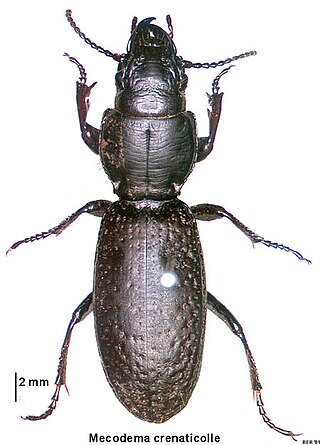
Mecodema crenaticolle is a medium-bodied ground beetle that is endemic to New Zealand. It is one of the three species within the ducale species group and is the only species of this group found in the North Island, New Zealand. Its range extends from the Wellington Region to Hunua Range, southeast Auckland, and is relatively common in most native forest habitats.

Mecodema dux is a medium-bodied New Zealand endemic ground beetle that is found in the Ruahine Ranges, Taupo, Rangitikei and southwestern Hawke's Bay entomological regions.
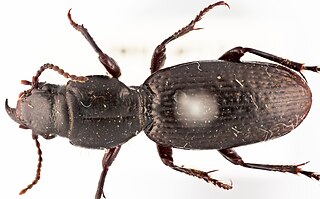
Mecodema longicolle is an endemic New Zealand ground beetle, and one of the few Mecodema species found in both the North Island and South Island.
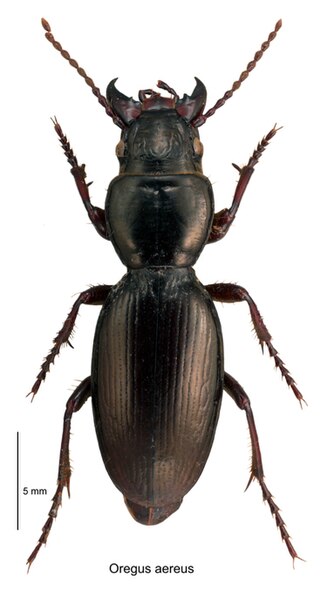
Nothobroscina Roig-Juñent 2000 is one of five subtribes within the ground beetle tribe Broscini. The subtribe consists of ten genera from the Gondwanan countries: Australia, New Caledonia, New Zealand and southern South America. All of these genera are endemic to their respective country, i.e., none of the genera are shared across any of the Gondwanan countries.
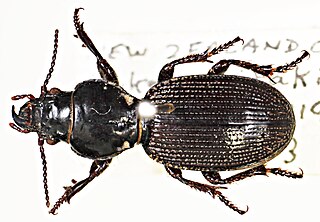
Mecodema aberrans is a medium-sized ground beetle endemic to the South Island, New Zealand. This species is within the curvidens group and is one of three species that is a braided-river ecotype. It occurs in Otago and Canterbury.
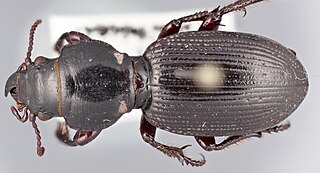
Mecodema moniliferum is a medium-sized ground beetle endemic to the South island, New Zealand. This species is part of the monophyletic curvidens group and is found on the braided-river systems of the South Island.
The subtribe Axonyina is a group of beetles in the Broscini tribe of Carabidae.

The subtribe Broscina is a group of beetles in the Broscini tribe of Carabidae.

The subtribe Barypina is a group of beetles in the Broscini tribe of Carabidae and is found throughout South America.
Anheterus is a genus of ground beetle in the subfamily Broscinae. The genus was described by Jules Putzeys in 1868 with the genus being found in Australia and containing the following species:

Mecodema crenicolle is an endemic species of ground beetle from New Zealand.














